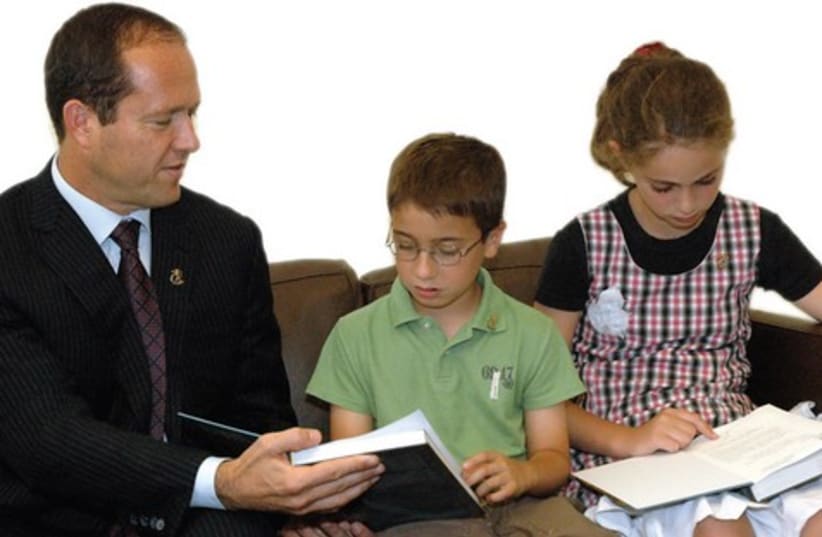Young, gifted and philharmonicIsrael has two philharmonic orchestras – the “big” one we all know (and appreciate), and a young one that brings quite a lot of honor to the country and to the city, since its center is at the Mishkenot Sha’ananim music center. Eighty talented musicians between 14 and 18, selected from among the best music students in the country, are invited to perform in Jerusalem.This year, the young musicians will gather for a special summer camp in the region under the baton of maestro Hans-Peter Oxenhoffer, a well-known musicologist and teacher who is coming from Vienna especially for the occasion. Two concerts – the result of the annual program of studies at Mishkenot and the three-week summer camp (beginning this week) – will be given in Tel Aviv and in Jerusalem (July 21 at the Jerusalem Theater at 8 p.m.), featuring works by Hindemith, Dvorak and Weber. This is not an easy repertoire even for professionals, but Oxenhoffer believes his students are capable of giving it their best.The retired Black PanthersJerusalem was shaken 40 years ago in a social earthquake. Residents from the underprivileged neighborhood of Musrara unleashed their anger and marched through the streets to express their frustration about their unbearable conditions of life and poverty. Most of the leaders of the time are not in the protest business anymore, except perhaps for Reuven Abergel, who is still involved in almost any protest and social action in the country.After meeting with their delegation, prime minister Golda Meir said, “They are not nice.” But many things have changed since then, and the local Black Panthers movement is something even representatives of the establishment are proud to recall was born here.On July 5, a special event will mark the date of the first big demonstration that took place 40 years ago. It will include naming an alley in Musrara Derech Hapanterim Hashorim (The Black Panthers Alley) and renaming another alley “Simtat Hem Lo Nehmadim” (“They Are Not Nice” Lane).Costly rehabilitationThe Lev Ha’ir community center and local neighborhood council is undergoing a strict rehabilitation program, following a serious financial crisis that almost shut down its activities. As a result, the council has been requested to look for self-generating income, such as renting some of its premises. This is a profound change to the existing policy there, led by center director Uri Amedi, who for the past 20 years promoted a community approach that was free of economic considerations.The first victim of this change is the religious youth movement Ariel, which has been asked to vacate the room it has been using for its activities so that it may be rented to a private organization.Amedi still hopes he will find an alternative place for the girls of Ariel, but as he told members of the council, things are really changing at Lev Ha’ir.
This week in Jerusalem: Back to the stadium
Peggy Cidor’s round-up of city affairs.

Young, gifted and philharmonicIsrael has two philharmonic orchestras – the “big” one we all know (and appreciate), and a young one that brings quite a lot of honor to the country and to the city, since its center is at the Mishkenot Sha’ananim music center. Eighty talented musicians between 14 and 18, selected from among the best music students in the country, are invited to perform in Jerusalem.This year, the young musicians will gather for a special summer camp in the region under the baton of maestro Hans-Peter Oxenhoffer, a well-known musicologist and teacher who is coming from Vienna especially for the occasion. Two concerts – the result of the annual program of studies at Mishkenot and the three-week summer camp (beginning this week) – will be given in Tel Aviv and in Jerusalem (July 21 at the Jerusalem Theater at 8 p.m.), featuring works by Hindemith, Dvorak and Weber. This is not an easy repertoire even for professionals, but Oxenhoffer believes his students are capable of giving it their best.The retired Black PanthersJerusalem was shaken 40 years ago in a social earthquake. Residents from the underprivileged neighborhood of Musrara unleashed their anger and marched through the streets to express their frustration about their unbearable conditions of life and poverty. Most of the leaders of the time are not in the protest business anymore, except perhaps for Reuven Abergel, who is still involved in almost any protest and social action in the country.After meeting with their delegation, prime minister Golda Meir said, “They are not nice.” But many things have changed since then, and the local Black Panthers movement is something even representatives of the establishment are proud to recall was born here.On July 5, a special event will mark the date of the first big demonstration that took place 40 years ago. It will include naming an alley in Musrara Derech Hapanterim Hashorim (The Black Panthers Alley) and renaming another alley “Simtat Hem Lo Nehmadim” (“They Are Not Nice” Lane).Costly rehabilitationThe Lev Ha’ir community center and local neighborhood council is undergoing a strict rehabilitation program, following a serious financial crisis that almost shut down its activities. As a result, the council has been requested to look for self-generating income, such as renting some of its premises. This is a profound change to the existing policy there, led by center director Uri Amedi, who for the past 20 years promoted a community approach that was free of economic considerations.The first victim of this change is the religious youth movement Ariel, which has been asked to vacate the room it has been using for its activities so that it may be rented to a private organization.Amedi still hopes he will find an alternative place for the girls of Ariel, but as he told members of the council, things are really changing at Lev Ha’ir.